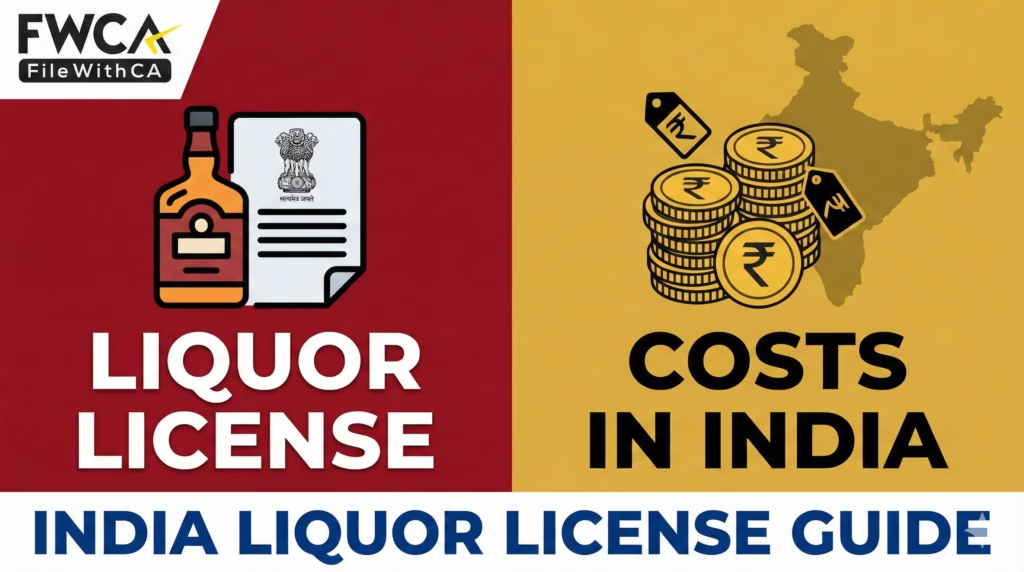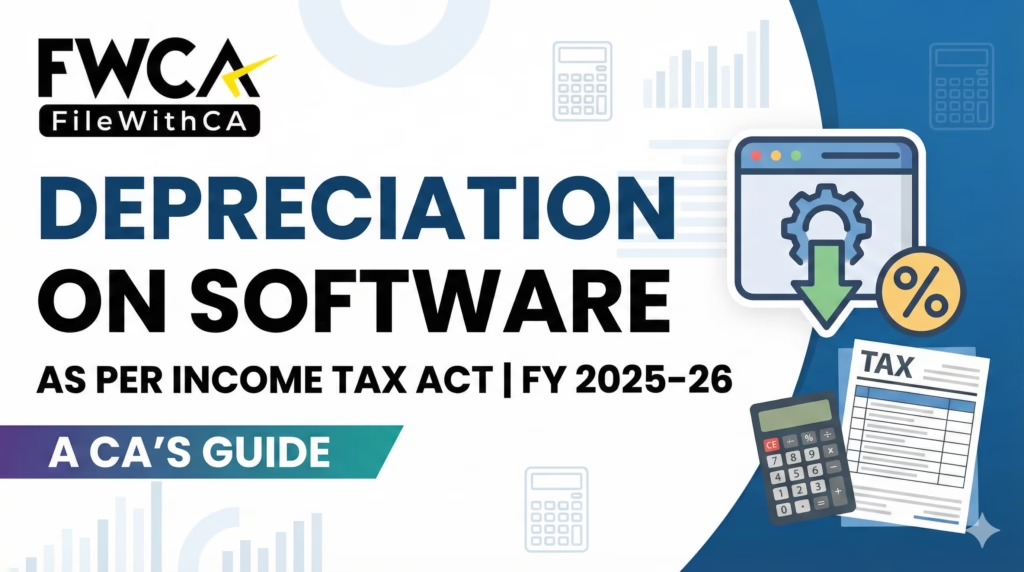GST Registration
Welcome to our dedicated service from FileWithCA for GST registration. As a leading Chartered Accountancy firm, we provide comprehensive GST registration services to individuals, entrepreneurs, and businesses of all sizes, ensuring a smooth, seamless process from start to finish. GST Registration is mandatory for trading or providing services in India. It facilitates compliance with the GST law, enabling businesses to charge GST, claim an input tax credit, and file GST returns.
Registering for GST lends a stamp of authenticity to your business, enhancing your reputation. It’s like a badge that says, “I’m a trustworthy, legitimate enterprise!” to your customers. Plus, it opens doors to a variety of benefits such as tax credits on purchases, which can significantly lower costs.
Don’t let your business idle. Grab that GST registration, and drive your venture towards the horizon of success. It’s simple, it’s efficient, and most importantly, it positions your business for the future. Let’s get on the right side of the law and the market – register for GST today!
- Basic
Enquire Us
GST Registration Unveiled | Your Key to Unlocking a Smooth Business Transition
Welcome to our dedicated service from FileWithCA for GST registration. As a leading Chartered Accountancy firm, we provide comprehensive GST registration services to individuals, entrepreneurs, and businesses of all sizes, ensuring a smooth, seamless process from start to finish.
Why GST Registration?
GST Registration is a critical step for any business entity engaged in the buying or selling of goods and services in India. It’s not just a legal mandate; it’s a growth catalyst for businesses of all sizes. Here’s why it’s important:
- Legal Identity as a Supplier: Registering for GST provides a unique GSTIN, legitimizing your business as a recognized supplier. It’s essential for creating invoices and availing input tax credits.
- Input Tax Credit: This key feature of GST allows businesses to reduce their taxes owed by the amount of GST paid on business-related purchases, lowering overall costs.
- Interstate Sales: Without GST, you’re limited to operating within your own state. Registration opens the pathway to a nationwide audience, expanding your market potential.
- Compliance and Reputation: Being GST compliant not only avoids legal issues but also builds your reputation as a trustworthy and reliable vendor in the eyes of customers and other businesses.
- Access to Tenders: Many government tenders require GST registration. It’s a door opener for new business opportunities.
- Online Marketplaces: Platforms like Amazon and Flipkart mandate GST registration for sellers. It’s a ticket to the e-commerce boom.
It is mandatory for businesses with a turnover of Rs. 40 lacks and above (Rs. 20 lakhs for Northeastern and hill states). GST registration helps in legitimizing your business and provides several benefits, including the ability to collect tax from customers, claim input tax credits, and more.
Who Should Register for GST?
As per GST law in India, it is mandatory for
- Businesses with Turnover Exceeding the Threshold Limit: Any business whose aggregate turnover in a financial year exceeds INR 40 lakhs (INR 20 lakhs for special category states) for the sale of goods, or INR 20 lakhs (INR 10 lakhs for special category states) for providing services, must register for GST.
- Interstate and E-commerce Operators: Businesses involved in interstate supply of goods and/or services, regardless of turnover, need to register for GST. This also applies to those supplying through e-commerce platforms.
- Casual Taxable Persons and Non-Resident Taxable Persons: Those who occasionally undertake transactions involving the supply of goods/services in a state/territory where they do not have a fixed place of business.
- Agents and Input Service Distributors: Agents of a supplier, Input Service Distributors (ISDs), and those who pay tax under the reverse charge mechanism must register for GST.
- Those Paying Tax Under the Reverse Charge Mechanism: Businesses that need to pay tax under reverse charge (where the receiver becomes liable to pay tax instead of the supplier) must register for GST.
- Individuals Registered Under the Pre-GST Law: Entities that were registered under the previous taxation system (e.g., VAT, Excise Duty, Service Tax, etc.) are required to register under GST.
- TDS/TCS Deductors: Entities that are required to deduct TDS (Tax Deducted at Source) or collect TCS (Tax Collected at Source) under GST must also register.
- Suppliers of Online Information and Database Access or Retrieval Services (OIDAR): Suppliers from outside India providing OIDAR services to a non-taxable online recipient in India.
Benefits of GST Registration
GST registration comes with a host of benefits that facilitate not just compliance but also empower businesses to scale and operate more efficiently. Here’s an expanded view of the benefits mentioned:
- Legal Recognition:
By obtaining GST registration, a business is legally acknowledged as a supplier of goods or services. This recognition is critical as it allows the business to legally collect GST from customers and pass on the credit of the taxes paid on the goods or services supplied to purchasers or recipients. It lends credibility and authenticity to the business, enhancing its standing in the marketplace. - Input Tax Credit (ITC):
One of the most significant advantages of being GST-registered is the ability to reclaim the Input Tax Credit. This means that at the time of paying tax on output (sales), you can reduce the tax you have already paid on inputs (purchases). This effectively lowers the overall tax burden on the company and can lead to substantial cost savings. It is a critical feature that encourages businesses to comply with tax payments as non-registered businesses cannot claim ITC. - Interstate Sales without Restriction:
GST registration eliminates the cascading effect of various state taxes that were applicable before the implementation of GST. Registered businesses can now engage in interstate sales without any constraints, allowing them to expand their market beyond local boundaries. This uniform tax structure across the country simplifies the process of selling goods in different states and brings in a transparent tax regime.
Additional Benefits of GST Registration:
- Competitive Advantage:
Businesses that are GST-registered are often preferred by potential trade partners who want to avail input tax credit. This gives registered businesses a competitive edge over non-registered entities.
- Compliance Simplification:
GST has subsumed various indirect taxes into one unified tax system, simplifying compliance. With GST, businesses need to file returns in a standardized format, reducing the complexities involved with managing multiple taxes and regulations. - Access to Financial Services:
A GST certificate serves as valid documentation for business existence, making it easier for businesses to open bank accounts, apply for loans, and access other financial services.
- Government Tenders:
GST registration is often a prerequisite for applying to government tenders. Without it, businesses may not be eligible to participate in these competitive opportunities.
- Online Marketplaces:
Selling on major e-commerce platforms generally requires GSTIN, making GST registration essential for businesses looking to leverage online marketplaces to reach a wider audience. - Enhanced Logistics and Supply Chain:
The uniformity of tax rates and the removal of interstate check posts after the advent of GST have resulted in improved logistics and supply chains, decreasing turnaround times and reducing costs.
- Legal Authorization to Collect Tax:
Once registered, a business is legally authorized to collect taxes from customers and pass on the credit of the taxes paid to the purchasers, establishing a systematic cycle of tax collection and credit.
Process of GST Registration
When you engage an accounting firm to assist with your GST registration, the process typically involves the following steps:
- Initial Consultation:
You’ll first have a consultation with the accounting firm to discuss your business structure and the requirements for GST registration. The firm will inform you about the necessary documents and information you need to provide.
- Document Collection:
The accounting firm will collect all the necessary documents from you. This could be done through email, a secure portal, or in person. These documents usually include PAN cards, identity and address proofs of the proprietors/partners/directors, business registration certificates, bank details, and a signed authorization form for the accounting firm to act on your behalf.
- Verification and Preparation:
The accounting firm will review all your documents for completeness and accuracy. They will then prepare the application form and any accompanying documentation.
- Digital Signature Certificate (DSC):
For certain types of businesses like private limited companies and LLPs, a Digital Signature Certificate is required for the authorized signatory. The accounting firm will either help you obtain one or use the DSC you provide.
- Filing the Application:
The firm will file the GST registration application on your behalf. This is done online through the GST portal. They will use the DSC to authenticate the submission, or if you’re a smaller business without a DSC, an OTP sent to your registered mobile number and email can also be used for verification.
- Application Tracking:
Post submission, the accounting firm will track the application status. If the GST officer requires any additional information or clarification, the firm will handle the correspondence and fulfill any requirements.
- GSTIN and Certificate:
Once the application is approved, a Goods and Services Tax Identification Number (GSTIN) will be issued. The accounting firm will provide you with the GST certificate, which is usually available for download from the GST portal.
- Post-Registration Compliance:
After registration, the accounting firm may offer additional services such as filing your periodic GST returns or advising on compliance matters to ensure you remain in good standing with GST regulations.
Throughout the process, the accounting firm acts as an intermediary between you and the GST authorities, ensuring that the process is as smooth and hassle-free as possible. They bring their expertise to bear in helping you avoid common mistakes and in understanding the complexities of GST law.
Our GST Registration Services
With a wealth of experience and a team of highly qualified professionals, we offer comprehensive GST registration services:
- Consultation: We provide detailed consultation to understand your specific needs and advise on the necessary steps for GST registration.
- Documentation: We guide you through all necessary documentation, ensuring accuracy and completeness to prevent any future complications.
- Application Process: We handle the entire application process on your behalf, including submitting your application to the GST portal.
- Follow-Up: We monitor the status of your application and liaise with the GST department, addressing any queries or issues that may arise.
- GSTIN Delivery: Once your GST registration is complete, we provide you with your unique GST Identification Number (GSTIN).
Why Choose Us for Your GST Registration?
- Expert Team: Our team comprises GST experts who stay updated with all the latest GST rules and regulations.
- Fast and Reliable: We understand the value of your time. Our streamlined process ensures a quick and efficient GST registration process.
- Transparent Pricing: Our GST registration services come with no hidden costs. We believe in providing quality service at affordable rates.
- 24/7 Support: Our dedicated customer support team is available round the clock to assist you with any queries or issues you may have.
Get Started with Your GST Registration
Ready to register for GST? Get in touch with us today. Our expert team is ready to guide you through each step of the GST registration process, ensuring a hassle-free experience.
Related Guides
Documents Required
The documents required for GST registration typically depend on the type of business applying for it. However, there is a common set of documents that are usually needed across different business entities. Here’s a list of documents that businesses and individuals would generally need to provide for GST registration:
For Individuals and Sole Proprietors:
- PAN card of the individual.
- Aadhar card of the individual.
- Passport-sized photograph.
- Proof of business registration or incorporation certificate.
- Bank account statement/cancelled cheque.
- Address proof of the business location (e.g., electricity bill, rent/lease agreement, property tax receipt).
For Partnerships and LLPs:
- PAN card of the Partnership or LLP.
- PAN card and Aadhar card of the Partners.
- Passport-sized photographs of the partners.
- Partnership Deed/LLP Agreement.
- Proof of appointment of the authorized signatory (for LLPs).
- Bank account statement/cancelled cheque of the Partnership or LLP.
- Address proof of the principal place of business.
For Hindu Undivided Family (HUF):
- PAN card of the HUF.
- Aadhar card of the Karta.
- Passport-sized photograph of the Karta.
- Bank account statement/cancelled cheque.
- Address proof of the principal place of business.
For Companies (Private Limited, Public Limited, One-person Company):
- PAN card of the Company.
- Incorporation Certificate of the Company.
- PAN card and Aadhar card of the Directors.
- Passport-sized photographs of the Directors.
- Board Resolution or Proof of appointment of the authorized signatory.
- Bank account statement/cancelled cheque of the Company.
- Address proof of the principal place of business.
Additional Documents:
- Proof of business registration or incorporation certificate.
- Letter of Authorization or Board Resolution for Authorized Signatory.
- Digital Signature Certificate (DSC) of the authorized signatory, which is mandatory for companies and LLPs.
- Any other licenses and registrations specific to the business or industry (if applicable).






